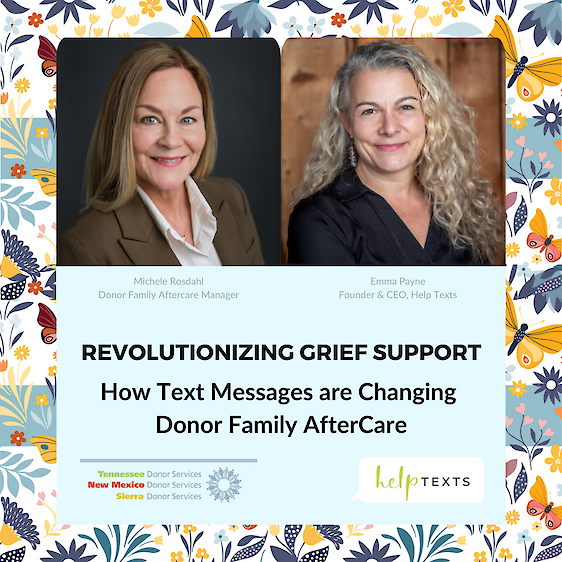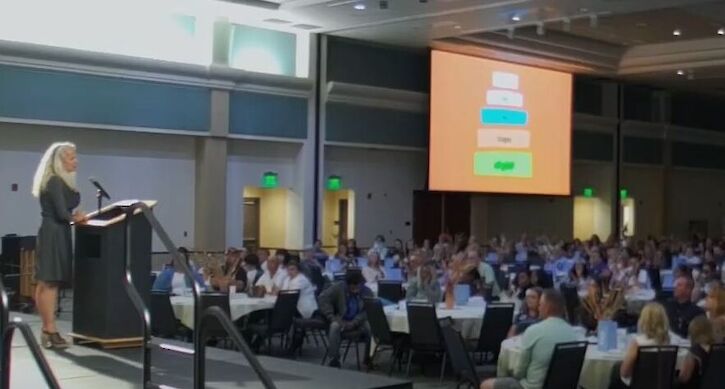Revolutionizing Grief Support: How Text Messages are Changing Donor Family AfterCare
When Michele Rosdahl and Emma Payne first met in February 2022, they quickly discovered that - in addition to sharing a deep commitment to bereavement care - they had something else in common. They both lost their partners to suicide. That meeting, and the women's immediate connection, fueled a partnership that has been delivering expert grief care to bereaved family members in Tennessee, New Mexico, and California ever since.
Michele is the Donor Family Aftercare Manager with DCI Donor Services, a healthcare organization committed to saving and improving lives through organ, eye and tissue donation. Emma is the founder and CEO of Help Texts, an innovative Seattle-based start-up that delivers expert, ongoing grief support via text, tailored based on age, relationship, cause of death and more.
"Supporting families after loss is deeply meaningful to me," Michele shared. "I was already doing this work when my wife died, and that experience helped me see even more clearly how critical it is to support people, especially after a sudden, traumatic loss. That's why I was so excited when I discovered the work Emma and her team were doing at Help Texts."
Michele and her team at DCI added Help Texts to their aftercare programs and the feedback from bereaved donor families began flowing in right away. Bereaved donor family members loved text support. With Help Texts' automated aftercare service each DCI family member received approximately 140 over the course of the year, acknowledging important dates such as birthdays, holidays, and death anniversaries, and sending expert grief support too.
The following year Emma and Michele decided to run a survey (also via text) to learn more, and the data was so compelling that it led to Michele and Dr. Melissa Lunardini, Help Texts’ Chief Clinical Officer, to be invited to present at the 2024 Annual AOPO Meeting. Together they shared compelling data such as 95% of donor families found the text-based aftercare service helpful and supportive in their grief.
DCI's Division Director, Michael Clay, was already deeply committed to bereavement support when he attended the AOPO presentation in San Antonio. When he heard the survey results he was immediately struck not only by his company's leadership in the space, but also by the enormous number of people Michele and Emma had cared for, fueled by their personal losses and determination to make sure that nobody ever has to grieve alone.
“The data is incredible,” Michael says. "Help Texts provides a simple, secure, low-cost aftercare solution that OPOs and tissue banks can use to deliver ongoing, highly personalized care for donor families. Text-based grief support is a proven family support pathway that makes it easy for organizations to elevate and streamline their aftercare experience, while simultaneously building a community of donation champions with every text. I am proud of Michele's leadership and the innovative thinking that led to bringing Help Texts on board to revolutionize the way DCI does aftercare."
One of the most striking aspects of Help Texts is its cost-effectiveness. With organizational package pricing as low as $69 per year, text-based support is more economical and practical than hiring additional staff. This affordability, combined with the amazing subscriber feedback, have led Help Texts to become an integral part of DCI’s Aftercare program.
And the benefits of Help Texts extend beyond just cost savings. By automating routine communications, text-based grief support frees up staff time so they can focus on more complex tasks, which enhances operational efficiency. This was particularly crucial for DCI, where a small team is responsible for supporting a large number of families.
Perhaps most importantly, Help Texts allows DCI Donor Services to maintain a long-term connection with donor families, demonstrating an ongoing commitment to their well-being. This consistent support not only enhances the experience of grieving families but also helps create long-lasting donor champions.
“Help Texts is much more than just a technological solution, Michael points out. “It's a strategic tool that can address current gaps in Aftercare services while enhancing overall support. It meets the growing needs of donor families who are requesting more frequent and personalized communication, and does so in a way that's both cost-effective and easy to implement.”
 In August, Emma traveled to Sacramento to present at DCI's "Locks of Legacy" ceremony. Michele and Emma met in person the night before Michele welcomed Emma to the stage to deliver the keynote address to the audience of over 400 bereaved family members whose loved ones became organ and tissue donors that year. Emma shared the story of her husband's suicide and how that loss inspired the creation of Help Texts. "I know all too well how isolating and lonely grief can be, and wanted to create a service that would change that," she explained.
In August, Emma traveled to Sacramento to present at DCI's "Locks of Legacy" ceremony. Michele and Emma met in person the night before Michele welcomed Emma to the stage to deliver the keynote address to the audience of over 400 bereaved family members whose loved ones became organ and tissue donors that year. Emma shared the story of her husband's suicide and how that loss inspired the creation of Help Texts. "I know all too well how isolating and lonely grief can be, and wanted to create a service that would change that," she explained.
In the days and weeks after the ceremony, Michele heard from many of the attendees who shared how much Emma's words and experience had helped them find hope. "It's an incredible gift, to know that I can help people feel a little less lonely and a little less helpless, even in the depths of grief," Emma said. "I created Help Texts in 2018, because every grieving person deserves expert support, without wait lists, stigma, language or distance getting in the way. Working with people like Michele and her team is amazing, because together there's really no limit to the number of families we can support, just when they need us."
Today Help Texts has emerged as a game-changing solution for DCI Donor Services. By leveraging simple SMS messaging to provide compassionate care, Help Texts not only supports grieving families but also empowers DCI's staff to deliver more effective and comprehensive services. "As we look to the future of donor family care, initiatives like Help Texts show us that sometimes, the most simple support can also be the most powerful," Michele says. "Help Texts is a critical step towards ensuring that no grieving family ever needs to feel alone in their journey."